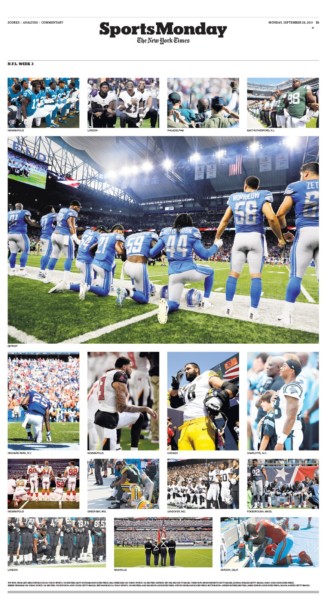Sign up for the daily CJR newsletter.
From an early-morning contest in London’s Wembley Stadium to a Sunday-night game just outside of America’s capital city, no one was sticking to sports. Thirty-six hours after President Donald Trump told an overwhelmingly white crowd in Alabama that NFL players who kneel in protest during the National Anthem should be “fired,” scores of players—many more than in previous weeks—took a knee. They were backed up by shows of solidarity from teammates, coaches, and even owners.
Trump’s comments, which he made at a Friday-night rally in support of Alabama Senator Luther Strange and expanded upon with a series of tweets over the weekend, drew blanket coverage. From a media perspective, this is another example of Trump’s ability to make every story about him. NFL players have been protesting during the National Anthem for more than a year, beginning with former 49ers quarterback Colin Kaepernick. They knelt, or raised a fist, to bring awareness to police brutality, institutional racism, and other big-picture issues affecting Americans of color. By lashing out over the weekend, Trump heightened the attention paid to the protests, but he also hijacked the issue.
Some have argued that Trump is using the issue as a distraction, attempting to appeal to his base while creating a news cycle that overwhelms coverage of the stalled Obamacare repeal effort, revised immigration ban, and continuing Russia investigation. Even if that is true, the president issuing racist diatribes against athletes participating in the country’s most popular sport, calling into question their patriotism and their right to protest, deserves the volume of coverage it has received.
ICYMI: CNN anchor gives startling hurricane report. The only problem? What’s in the background.
Throughout the day, player reactions dominated the news. Analysis of Trump’s words and the expected protests appeared early and often during televised pregame shows. Fox, CBS and ESPN showed the anthem live, a break from their normal practice of going to commercial during the singing of the Star-Spangled Banner. This morning The New York Times and The Washington Post each went with four-column, A1 photos of anthem protests, while both New York tabloids splashed the story on their front pages.
Below, more on a day of protest across the NFL.
- Sports in the real world: “It can be tempting,” writes Toronto Star columnist Bruce Arthur, “to believe sports is a shiny, ridiculous bubble of wins and losses and dingers and dunks.” But, “stick to sports, as an idea, was always a childlike fantasy or a disingenuous barb, and it is as dead as it has ever been.”
- Why they knelt: Great column by the Indianapolis Star’s Gregg Doyel on the reasons two Colts players chose to protest on Sunday.
- Network coverage: Sports Illustrated’s Richard Deitsch has a behind-the-scenes look at how ESPN and other networks covered Trump’s comments and players’ protests.
- Trump widens the breach: Summarizing Trump’s weekend of vitriol (which was not limited to criticizing athletes), veteran New York Times White House reporter Peter Baker writes: “Never in modern times has an occupant of the Oval Office seemed to reject so thoroughly the nostrum that a president’s duty is to bring the country together.”
- Kaepernick wins the day: ESPN’s Ian O’Connor writes that Colin Kaepernick’s presence loomed large over the day’s protests.
Other notable stories
- In the wake of Rolling Stone being put up for sale and the departure of four top editors from prestigious mastheads, The New York Times’s Sydney Ember and Michael M. Grynbaum look at the not-so-glossy future of magazines.
- BuzzFeed’s Charlie Warzel writes that there’s little Mark Zuckerberg can do about what you see on Facebook “because he’s not really in charge of his platform—the algorithms are.”
- For CJR, Ariel Stulberg has an interesting look at the patchwork paywall policies of the nation’s largest newspapers.
- Margaret Sullivan’s Sunday Washington Post column is on the state of free speech in America. It’s not a pretty picture.
- Jim Rutenberg dives into Colbert, Kimmel, and the politics of late night in his Sunday column for the Times.
Has America ever needed a media defender more than now? Help us by joining CJR today.








